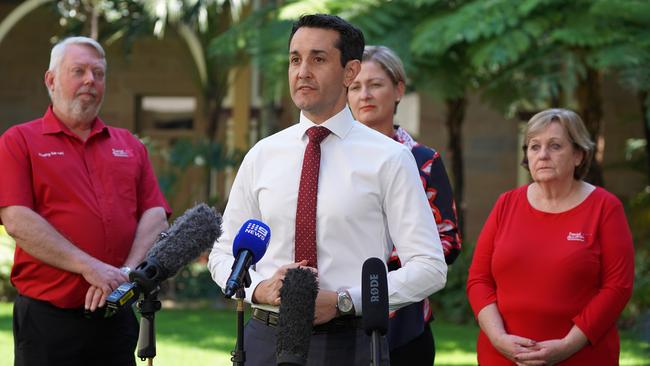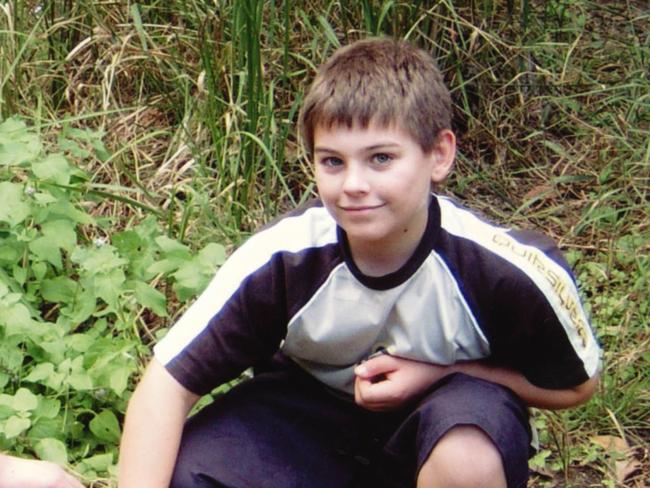LNP details ‘Daniel’s Law’ as Miles weighs in on child sex offenders register
Opposition Leader David Crisafulli has detailed plans and the cost of a public register of Queensland’s convicted child sex offenders, as Premier Steven Miles weighed in on the idea.
Police & Courts
Don't miss out on the headlines from Police & Courts. Followed categories will be added to My News.
A public register of Queensland’s convicted child sex offenders could cost less than $10m to implement, Opposition Leader David Crisafulli has said, as Premier Steven Miles flags possible support of the LNP’s latest election promise.
As reported by The Courier-Mail, the LNP has pledged to set up a “three-tier” public register of convicted child sex offenders should they take government in October - as predicted by the polls.

Queensland’s system would be “very similar” to what is in place in Western Australia and soon to be implemented in South Australia.
Mr Crisafulli said the LNP had set aside $10m toward the plan dubbed “Daniel’s Law” after murdered Sunshine Coast teenager Daniel Morcombe.
“My commitment to Queensland is, if it costs less to do that, that money will be spent to increase the number of child protection officers over and above the current plan that we have to add more police,” he said.
“I think it is important that every parliamentarian is able to have a say about what the legislation looks like.
“My view is we will look at the model in Western Australia and what is currently being rolled out in South Australia. Both of those bits of legislation are very, very similar.”
Mr Miles said the government would “have a look” at the LNP’s plan.
“If there are elements of it that are sensible and that can keep Queensland kids safer, then we’ll consider those,” he said.
“I’ve been monitoring the Western Australia model (and) I’ve been discussing with Premier Peter Malinauskas the system they are putting in place in South Australia.”
Under tier one of the plan, offenders who are at large or fail to comply with reporting and other conditions, will be named and their picture flagged on a website.
Tier two will allow the public to apply to find out which dangerous or high-risk offenders were currently living in their area and request photographs of them.
While under tier three, parents or guardians will be able inquire about a specific person who has regular, unsupervised contact with their children.

Daniel Morcombe’s father Bruce said it was “frustrating” a public register of child sex offenders hadn’t been implemented in the last decade.
“It’s just peculiar that at a federal level, and state by state and territories, that there’s been issues that have blocked it,” he said.
“Let’s not forget that over 20 years ago, our son Daniel was murdered, abducted by a twice-convicted paedophile, so that person was under the radar,” he said.
“His family and his wife, we don’t believe even knew of his past horrific offending, and we’ll never know whether the deterrent factor of a public, accessible sex offender register would have made a difference in (Daniel’s killer) Cowan’s case. But we hope going forward, it will,” he said.
Daniel was murdered in 2003 by now-jailed child sex monster Brett Peter Cowan.
The Morcombes on Sunday also commented on the importance of child safety following the Premier’s revelation about he and his wife Kim struggling to protect their children from the dangers of social media, including discovering a stranger attempting to solicit photos through popular children’s game ROBLOX.
Speaking exclusively to the Sunday Mail, Mr Miles and Ms McDowell shared the daunting experience when one of their children was targeted through the ROBLOX chat function, requesting inappropriate photos.
Mrs Morcombe said Mr Miles’ story showed it didn’t matter who you were, all children were in danger online.
“Doesn’t matter if you’re the Premier’s child or not. I mean, all parents need to keep their kids safe on all devices,” she said.
“There’s so many predators out there. Everyone needs to make sure that their children are safe with who they’re talking to.
“The parents pay for the devices, they pay for the Internet and the mobile services. Parents should be watching what children are doing.”




